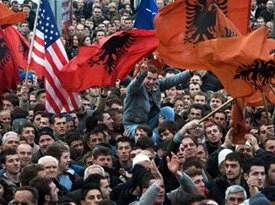Lessons of Kosovo: Expedient (In)dependence
The carefully coordinated declaration and recognition of ‘independence’ for Kosovo is being viewed by the media in two ways:
1. As the eventual and hard-won outcome of years of struggle against Serbian domination;
2. As an attempt by the US and NATO to further the cause of ‘democratisation’ in the former socialist states.
Both of these analyses contain some degree of truth. Firstly, the desire for Kosovar independence surfaced as a reaction to the increasing Serbian brutality in the 1980s and, later, in the late 1990s. Such brutality was largely orchestrated by Milosovic to shore up faltering domestic support but, with it, the resistance to Serbian rule grew and increased the militancy of those seeking autonomy and, then, independence. Thus by the late 1990s the majority of Kosovars viewed the control of Kosovo by Belgrade as an occupation and welcomed the NATO bombs that promised ‘liberation’. Thus, the recent establishment of a Kosovar state can be seen as the end of this process.
Secondly, the question must be asked as to why the US and EU support the claim of Kosovo to independence yet hold no sympathy for the identical demands made by the Basques, the Corsicans or, indeed, the Irish whose respective histories bear witness to at least an equal legitimacy in their claim to autonomy?
What is it about Kosovo that makes its argument so much more compelling to the US? It is in these questions that the true meaning of Kosovar ‘independence’ can be discerned, for as we have seen with US military expansion in the former socialist states (the proposed and existing military bases and launching sites in Poland, Czech Republic, Romania, etc.) the geopolitical struggle between what were the world’s only two superpowers is far from over. Thus, a new state ‘liberated’ from Slavic domination by NATO bombs stands as a rare victory for the Washington warmongers.
However, the new dispensation for Kosovo is not merely a part of a wider geopolitical struggle between a faltering US and a resurgent Russia. The role of the EU in this enterprise cannot be ignored and, indeed, an analysis of its role will be instructive as to the true nature of its objectives and how it acts to achieve them.
In relation to this it is worth noting that the ‘newly independent’ Kosovo’s executive, legislature and judiciary will be subject to an absolute veto by the EU’s (formerly NATO’s) man in the Balkans, Peter Feith. And, in case it was thought that such a position was purely functionary or symbolic, it is worth baring in mind that there will be a significant groundforce of troops and police to enforce any decision made by Feith. Thus, any attempt, however unlikely, made by Kosovo to follow a truly independent line will automatically be scuppered by the neoliberal dictats of the EU. In this way Kosovo wil be exposed to exploitation by European and US firms attracted by EU-funded subsidies and low labour costs (amongst the lowest in Europe due to an unemployment rate running at up to 80 per cent).
Thus, the people of Kosovo are being lead down a route of dependence and exploitation, not one of independence and self-determination. The role of NATO, the US and the EU in all this is clear – spread ‘democracy’ with bombs, talk the language of ‘freedom and autonomy’, then clear the way for the wholesale parasitic exploitation of the people under the name of ‘prosperity’.


